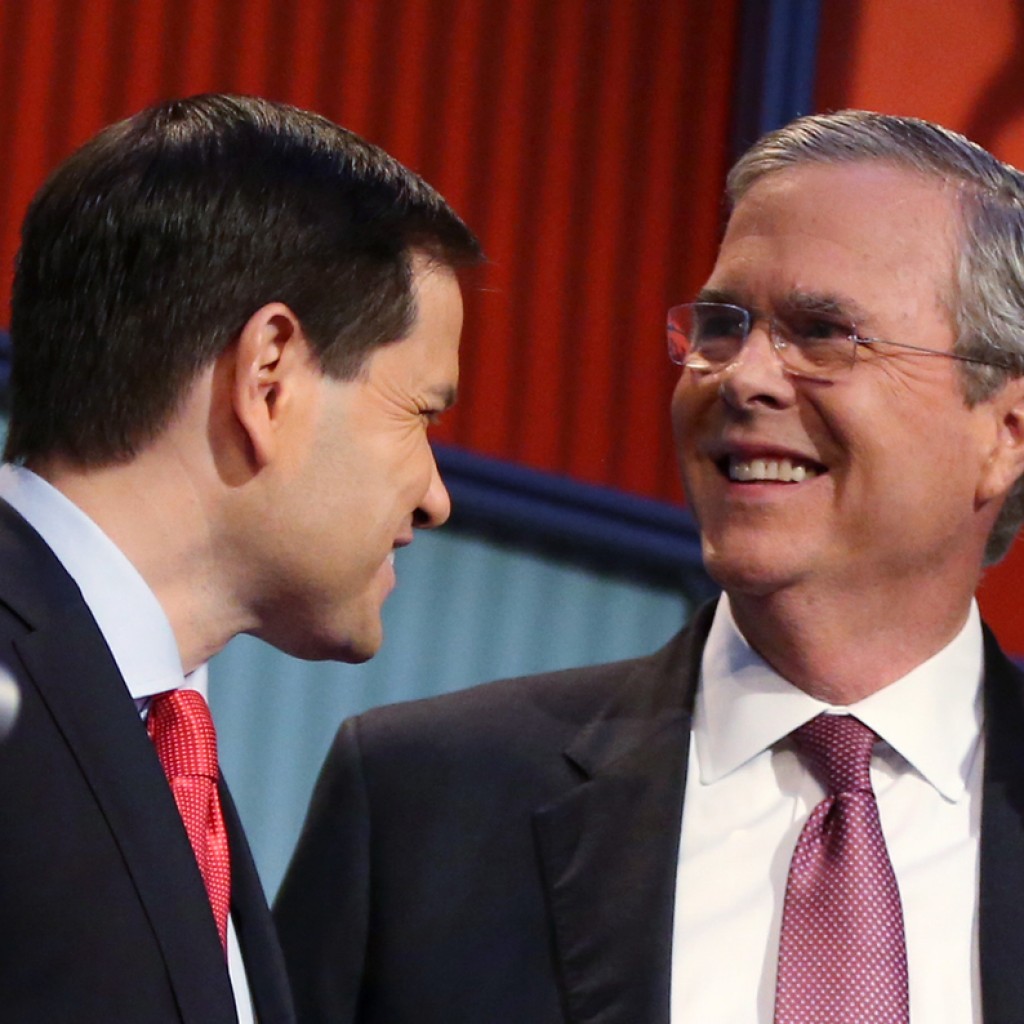
Hundreds of donors to Jeb Bush‘s presidential campaign will gather later this month in Houston. They’ll shake hands with a pair of former presidents, and high-profile lieutenants of the former Florida governor will push them to write generous checks.
This weekend in Las Vegas, dozens of donors met up with Marco Rubio. They ate fast-food hamburgers, shook hands with a celebrity pawn-shop owner, and played flag football with the Florida senator.
“I’d say he threw five interceptions, maybe three or four touchdown passes,” Wayne Berman, Rubio’s national finance chairman, said playfully. “There were a lot of middle-aged guys trying to show off.”
There are more than a dozen major candidates in the Republican presidential primary, and although outsiders Donald Trump and Ben Carson top the current preference polls, it’s the two Floridians — Bush and Rubio — at the head of the second wave.
They’re competing for same donors who traditionally support GOP White House candidates, and their October finance summits illustrate how each plans to pay for their presidential ambitions with the hand he was dealt. They are also evidence of how Bush, with four months to go before the lead-off Iowa caucuses, enters the fall with a distinct advantage over his one-time protege.
The son and brother of presidents, Bush came to the race with a sprawling network of experienced fundraisers. He also spent months personally wooing wealthy donors for a super PAC designed to help him win.
Rubio had none of those advantages. He’s the son of working-class immigrants, and as a sitting senator he is legally barred from raising money for a super PAC that backs him. As a result, his campaign and the super PAC collected less than a quarter of the $114 million the Bush team raised in the first six months of the year.
“We have no margin for error in our fundraising,” Berman told The Associated Press as the weekend retreat for about 70 top donors was wrapping up inside a hotel on the Las Vegas strip. But, he added, “Our ability to raise money is dramatically improving.”
It has to.
In modern American politics, money is often the strongest predictor of success. Even though Rubio’s poll numbers are improving, his fundraising is badly lagging several Republican competitors. Texas Sen. Ted Cruz doubled Rubio’s take from donors over the past three months, while Carson, the retired neurosurgeon, tripled it.
Money raised for a presidential campaign is usually consumed by one thing above others: television advertising. And in TV dollars Bush’s distinct financial advantage is already starting to play out in the campaign.
Bush and his super PAC, Right to Rise, have begun a planned $50 million television advertising blitz. Pro-Bush commercials hit the air several weeks ago and are booked to run continuously in the early voting states of Iowa, New Hampshire and South Carolina through February, according to information collected by Kantar Media’s CMAG advertising tracker.
Meanwhile, Rubio and the super PAC helping him, Conservative Solutions, have reserved ad space worth about half that amount. They’re putting off expensive broadcast TV commercials until the week of Thanksgiving, according to tracking information updated through Friday.
The campaigns and outside groups can purchase ad space at any time, meaning those plans could change. But the ads only become more expensive, particularly for the super PACs. Any investment now pays extra dividends.
Rubio’s team currently cannot afford the TV space it has reserved, so it must raise more money to see them through. Bush’s team, particularly his allied super PAC, might not need to bring in another dollar to fund its TV strategy well into next year.
Bush’s financial advantage loomed over Rubio’s donor retreat at the Bellagio Hotel and Casino this past week as senior aides shared political and fundraising strategy with top donors. While Bush’s retreat will feature former Presidents George H.W and George W. Bush, the best-known supporter at Rubio’s gathering was Rick Harrison, the Las Vegas pawn-shop owner and one of the “Pawn Stars” of the reality television show.
Bush hasn’t yet said what he raised between July 1 and Sept. 30, but he’s thanked supporters in an email that said the campaign beat its fundraising goal. Rubio’s early numbers are in — and they aren’t good.
His fundraising dropped to just $6 million over the summer, aides told donors this weekend. While the campaign began October with $11 million in available cash, the nearly $17 million worth of advertising reservations that begin in November show just how quickly that money can evaporate.
Still, Rubio’s campaign has been thriftier than others. He was paying salaries for 18 people at the end of June compared to Bush’s more than 50. His campaign manager, Terry Sullivan, has bragged about pinching pennies, saying he must approve any expense over $500. He said Rubio almost always flies commercial.
Rubio is also getting millions of dollars in advertising help from a nonprofit group that doesn’t make public its donors. Its pro-Rubio commercials are on the air at a time when the campaign and super PAC haven’t been.
More help could be on the way.
Rubio shared a private dinner Thursday night in Las Vegas with Sheldon Adelson, the billionaire casino magnate who with his wife donated more than $90 million during the last presidential contest. Rubio, like other Republicans, has aggressively sought Adelson’s endorsement.
He’s yet to publicly pick a favorite.
Republished with permission of The Associated Press.



